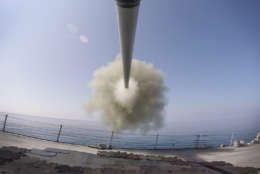Defense
-
Senate Armed Services Committee Chairman John McCain (R-Ariz.) laid the weight of DoD's first audit squarely on the shoulders of David Norquist, President Trump's pick for DoD comptroller. The department hasn't been audited in 17 years, and has spent the past seven engaged in audit-readiness preparations.
May 10, 2017 -
The new chairman and ranking member of the House Armed Services Personnel Subcommittee tell Federal News Radio what they are thinking for the next NDAA.
May 09, 2017 -
The secretive Pentagon organization that’s in charge of turning existing weapons systems into new warfighting concepts says it has a perfect track record so far. The military services have accepted all six of the technologies the Strategic Capabilities Office has offered up.
May 08, 2017 -
Preliminary analysis by the Aerospace Industries Association (AIA) shows the number of new regulations agencies and vendors must adhere to has increased from 16 to 142 since 2009.
May 08, 2017 -
The Defense Information Systems Agency has set up an approach for customers to send money to a working capital fund to pay for cloud services based on usage.
May 08, 2017 -
The Nationals celebrated the Navy this week at Nationals Park. Check out all the sights.
May 05, 2017 -
The Senate Armed Services Personnel Subcommittee is preparing its provisions for the 2018 defense authorization bill and this week it heard from some former top DoD officials. Family life seemed to be the bottom line for a lot of military issues. Employees want to be able to move between the civilian and military world, they want quality childcare for their children and they want their spouses to be happy and be able to work where they are stationed.
May 05, 2017 -
The Defense Department's Strategic Capabilities Office has managed to successfully transition all six of the weapons systems it's developed into programs of record that are now controlled by the military services. The secret to its success, according to the SCO's director, is its insistence on prototyping.
May 05, 2017 -
The Army's quick response acquisition shop is beginning to field technologies.
May 03, 2017 -
New Defense guidance says the blanket hiring freeze is now over. But it includes several caveats in line with the goal of reorganizing and reducing the size of the federal workforce.
May 03, 2017 -
In today's Top Federal Headlines, the Defense Department is rescinding a policy which let graduates pursuing careers in professional sports defer their military service.
May 03, 2017 -
The Navy plans on hiring for work in shipyards now that it has funds to maintain its fleet.
May 02, 2017 -
The Navy brass have decided to buy a dozen new ships they're calling a frigate. But it's basically a littoral combat ship with some modifications. The Government Accountability Office found there's too little information about the frigate for Congress to make informed decisions. Michele Mackin, director of acquisition and sourcing issues at GAO, provides details on Federal Drive with Tom Temin.
May 02, 2017 -
Besides proportioning DoD’s appropriations into roughly the same accounts officials had asked for, the plan includes a 2.1 percent pay raise for both military members and civilians.
May 02, 2017 -
As agencies begin to implement the EO over the next eight months, the potential elimination of various carve-outs is going to be the most interesting thing to watch — and the thing that most worries the folks who pay close attention to Defense technology procurement.
May 02, 2017















